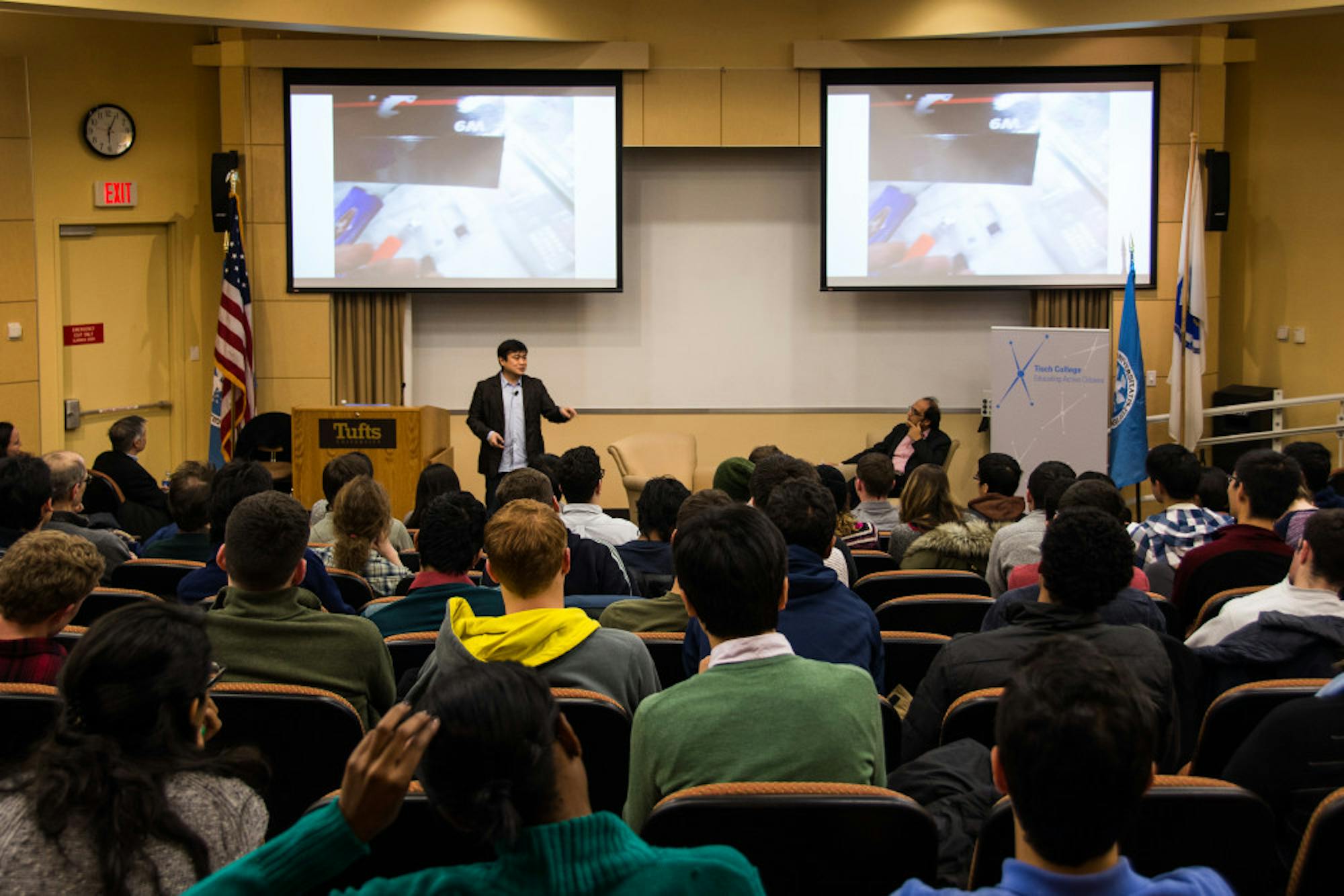Joi Ito, entrepreneur and director of the MIT Media Lab, presented a lecture to the Tufts community titled "How the Internet Has Changed the World: Civic Engagement, Innovation, Learning and Technology Today (and How We Got Here)" as part of the Hitachi Center for Technology and International Affairs' Speaker Series.
The event, which took place in Cabot ASEAN Auditorium on Friday evening, was co-sponsored by Tech@Fletcher at The Fletcher School of Law and Diplomacy and the Jonathan M. Tisch College of Citizenship and Public Service.
Ito was introduced by Peter Levine, director of CIRCLE at Tisch College, and Bhaskar Chakravorti, senior associate dean of international business and finance and executive director of Fletcher’s Institute for Business in the Global Context and Council on Emerging Market Enterprises.
Chakravorti underscored Ito's talents as an innovator, investor, activist and more. He also noted that Ito actually dropped out of Tufts.
Ito acknowledged that he left Tufts one semester before graduating, during a period when the internet was just starting, calling it a "pivotal moment."
"It was difficult to find the education that I wanted," he said, explaining that he sought a program that was situated at the convergence of computer networks, journalism, media and content, politics and the impact of networking.
Ito talked about the significance of the internet's introduction into everyday life, mentioning how different life was before the internet became standard.
"Things tended to be relatively predictable," he said. "When something happened, there was an effect."
However, the spread of the internet significantly changed this dynamic, according to Ito.
"Things became complex, things became very fast, things became basically unpredictable," he said. "Whole disciplines have become nearly irrelevant, and whole businesses have become very challenging.”
Ito discussed the rise of computer usage and internet access and the new opportunities this provided for development and creativity, noting that "this was the first time that a bunch of students could actually compete with a telephone company."
He also underscored the importance of open innovation, the concept by which anyone can compete without asking for permission, as well as innovation at the communication level, which brought the cost of communication across the world to nearly zero.
"The total cost of innovation goes down," Ito said. "When you lower the cost of innovation, that frees you from having to ask permission from anybody."
Ito also discussed the development of Safecast, a project he helped create after the Fukushima Daiichi nuclear disaster in 2011 that uses open hardware to help map radiation levels. According to Ito, by bringing together relevant specialists to deal with the situation while avoiding bureaucratic policies, the project was implemented with almost no costs.
Cities like Shenzhen in China provide the kind of environment that is conducive to this kind of necessary innovation and creativity in technological development, Ito explained, citing the city's cellphone manufacturing as an example.
Next, Ito touched on how the innovation of the internet has affected other sectors such as bioengineering, noting the growth in do-it-yourself bioengineering and government agencies' support of new projects.
"It was a reaction to a mistake that [government agencies] made to alienate the hackers,” he said. "We have a much healthier relationship with the government."
Researchers are now able to use programming language to force bacteria to complete certain functions, Ito said. Similarly, the cost of sequencing the human genome is dropping drastically.
Ito also discussed MIT's awarding of stockpiles of Bitcointo its students so they could attempt to hack the electronic currency.
"How do we reinvent the financial system to be better?" he asked.
Ito explained that today's researchers are designing a world for people who will be very different from those of today's society, citing children who are now taking mobile technology for granted.
He then spoke about the merits of formal education and alternative forms of learning, stating that "learning is what you do to yourself, education is what other people do to you."
"For me, college felt like you have to read the whole encyclopedia from end to end before you were allowed to do something," he said.
With the modern availability of online information through sources such as Wikipedia, Ito emphasized learning through projects.
"At the media lab, what we often talk about is that creative learning is important," he said. "For me, creative learning … requires a very different framework, which is projects."
Ito said that his core principles include learning over education, practice over theory, pull over push and disobedience over compliance.
He concluded by discussing the potential of new technologies and artificial intelligence, examining the role of media and networking during the Arab Spring.
"We know how to destroy and overthrow, but how do we rebuild?” he asked.
Entrepreneur discusses innovation and role of technology

Joi Ito, an activist, entrepreneur, and Director of the MIT Media Lab, gave a lecture on how the internet has changed the world at Tufts University as part of the Hitatchi Speaker Series.





